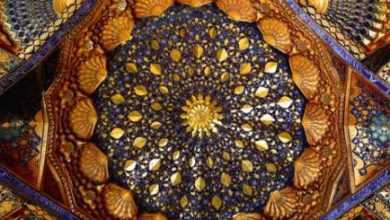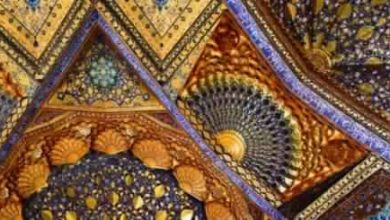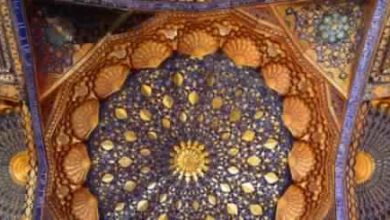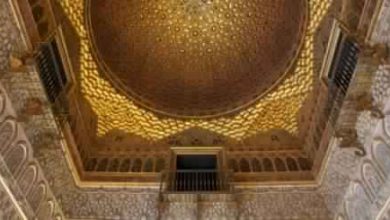THE ESSENCE OF HAJJ – PART 4
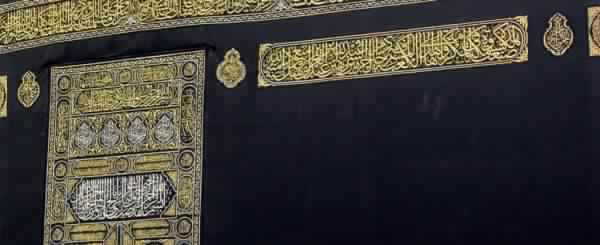
Within the Haramain
For a building which represents the oldest place of worship in the world and is the geographical and spiritual heart of the Muslim faith, the Ka’bah is a basic, almost primitive structure. It emphasises the clear fact that no man made structure can ever compete with any of Allah’s creation. The Ka’bah takes on the most simple three dimensional form possible for a building – a basic cubic structure made of out stone. It was asked by King Abrahah, who unsuccessfully tried destroy the Ka’bah in the year of Rasulullah’s SAW birth, why the King of Kings has such a simple palace on earth. A man during that assembly explained that it is because the Owner of the earth did not value the earth enough to build His divine palace there. This incident reminds us that the contents of this earth are not worth chasing after.
The Ka’bah is surrounded by Masjid Al Haram, and it is possible to perform your salat either directly in front of the Ka’bah or within view of the Ka’bah from one of the upper floors of Masjid Al Haram. Regardless of whether the Ka’bah is visible to you or not, one salat in Masjid Al Haram is worth 100,000 in any other ordinary masjid. One salat in Masjid Al Nabawi, Madinah is worth 1000 of any other ordinary masjid. Within the vicinities of the Haramain (the two Harams), Allah is giving us abundant opportunities to reap His rewards. How many days and months will it take us to perform 1000 salat, what more 100,000? We should grab this opportunity and not get distracted from that goal. The primary objective of the trip is to gain the rewards promised by Allah within the limited timespan of your time in the Haramain, and every minute is a gold mine of spiritual rewards.
Bear in mind the manners of being in the masjid. For example, the Prophet SAW admonished those who indulged in empty chit chat in the masjid. Voices were not allowed to be raised and discussions on dunia affairs, even the announcement of a missing item, was disallowed. When you are in the parameters of the Haramain, be aware that you are standing in the holiest spots on earth. If your tongue is not engaged in prayer, reading the Qur’an or in the remembrance of Allah, it is better to stay quiet. Many people during hajj are not conscientious of their surroundings and are busy chatting about politics, sports, property prices or are even on the phone discussing what their children at home had for dinner. Some people are even busy playing games on their phone in between salat times. Such actions are devoid of Allah and the purpose of the trip.
Discounting travel time, jet lag, exhaustion and generally getting yourself oriented to the new environment, you will not be left with much time for active worship. Do not lose your time over silly arguments, complaints or worries about the latest occurrences at home. Don’t let Shaitan deceive you into digressing from the purpose of your trip.
Allah will also be watching how you spend your time. Will you be in the hotel room watching TV most of the time? Will you make the effort to be at the masjid on time for all the prayer times? Will your mind be preoccupied by the enticing malls surrounding the Haramain? Will you be busy posting selfies or engaging in useless discourses? All this time in the Haramain is Allah’s gift to you, and should be spent wisely. Connect yourself to Allah, and not to Facebook, WhatsApp, Twitter or the social media.
Practical challenges
During any hajj or umrah, your patience and tolerance will be tested, regardless of how much you paid your travel agent. Be prepared that despite the best planning, things will go askew. Delays will occur, there may be problems with the accommodation, and the food may not be to your liking. Some of these incidents can be caused by the mistakes of others, some by your own oversight and others by unexpected events beyond your control. Some incidents can be annoying, and others have the potential of destroying your hajj if you are not careful.
Allah is testing the sincerity of your faith and intention, in the way you react to every incident. Be careful of what you say, because your arrogant, rude or derogatory words can ricochet immediately and you will find yourself paying the price of such words in some form or another. Are you willing to spoil your hajj just because someone took your seat on the bus or that the food was bland? Is it worth commenting that a particular person smells bad or to be boastful to others? Rather, it is better to keep your heart connected to Allah at all times.
Guarding our behaviour is made more challenging with the heaving crowds, the fatigue, weather, dust, sand and hours of unexpected waiting time. No one promised that the conditions would be easy, especially when in Mina, Arafat and Muzdalifah. At the time that we are supposed to be at our best, conditions around us will provoke our tempers. Be mindful to behave with restraint, patience and tolerance at all times, even if those around us do not reciprocate.
What happens during the hajj is a trial or test from Allah depending on the state of our hearts. The hajj is a costly trip, and it is natural to get upset when we don’t get good service in return. Be patient when you try to resolve the issues. After all, does your service to Allah match the bounties He gave you?
Problems can start as early as the immigration queue entering Saudi Arabia, and they will persist throughout. Your luggage might be misplaced. Your things might be stolen. Your travel companion may fall ill, be a difficult person or even pass away. Your transport might not show up. Not a single person has ever enjoyed an incident free hajj. Every time you think about arguing, remember that it breaches the pillar of Hajj to argue. If we cannot control ourselves in these few days, how can we control ourselves in life?
In hajj you will experience a lot of calamity. It seems so hard but our incidents are minor compared to what our grandparents had to endure. Imagine their struggle to reach Mekah by whatever means, even if it entailed risking their lives on an overcrowded ship. These were the days before mandatory inoculations and five star hotels. Health and sanitary concerns were real. Yet, they did not mind roughing it out or even dying during the journey because the promise of Paradise was so precious to them.
Allah is just and He is also merciful. Our trials correspond with the strength of our faith. Perhaps over the generations we have grown softer and less resilient. Maybe this is why our trials are light in comparison.
We have to consistently and consciously control our nafs and remember who we are dealing with. When we get upset, remember that we are on the journey of hajj and the journey of the Day of Judgment. Put aside all the illusions of dunia and turn to the truth of Allah. Control ourselves from oppressing each other, and try to build love and humbleness towards each other. Think of what we are trying to accomplish and never lose sight of that goal.
Remember that the same way that rewards for our good deeds are multiplied when in the Haramain, so are the punishments for our bad deeds. We must be vigilant of our actions and reactions at all times. Avoid dishonesty, boasting and cheating, and of course, committing sins.

